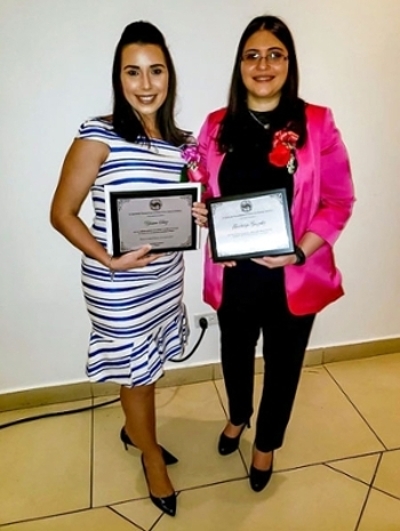
In honor of International Women’s Day, the Panamanian Association for the Advancement of Science recognized eight women with an inaugural award celebrating their valuable contributions to science, technology and engineering in Panama. Among them were Dr. Yessica Sáez ’15 and Dr. Guadalupe González ’10, two former students from the Department of Electrical and Computer Engineering at Texas A&M University.
Since its foundation in 1985, the Panamanian Association for the Advancement of Science has strived to promote science and technology as the foundation of national development. It actively participates in projects and research that shape policies and development strategies in Panama.
“I consider celebrating women important for many reasons,” said Sáez, a researcher at the Technological University of Panama. “As a woman and an engineer, I believe that this kind of award not only promotes fantastic young female engineers and their achievements, but also vitally raises awareness of the shortage of female engineers in the world.”
Enhancing mobility
The leader of her telecommunications engineering research team, Sáez is investigating how intelligent systems can be applied to society. Among her various projects funded by the Panamanian government is the development of a radio frequency-based assistive program for visually impaired people called MOVIDIS (Mobility for Visually Disabled People). Proposing a means of providing autonomous mobility in public transport and indoor environments, MOVIDIS uses radio frequency communication and embedded systems to help the visually impaired navigate their day-to-day lives.
In addition to being easy to use, the prototyped MOVIDIS is inexpensive, modular and does not use audio cues — which keeps it from being burdensome or distracting to those who need it most.
“With the implementation of the proposed system, the lives of visually impaired people in Panama will change. It gives them the opportunity to reach their destination and to contribute positively to our society by overcoming the obstacles related to their ability to move freely and without the help of a tutor,” said Sáez.
Expanding collaboration
González, an associate professor at the Technological University of Panama, has directed the SMARTS-E research group for nearly eight years. SMARTS-E provides a successful example to Panama as to how innovation can be enhanced through collaboration.
Since 2013, González has collaborated with health science experts in the prestigious Institute for Scientific Research and High Technology Services (INDICASAT-AIP) in Panama to investigate how to eradicate malaria.
“These collaborations have allowed us to create an interdisciplinary group with students and young professionals from both electromechanical engineering and biology in a country where this type of multidisciplinary collaboration is new,” said González.
And that’s critical.
Bringing together experts from various backgrounds to solve societal problems offers a diverse set of skills, perspectives and knowledge. In turn, this allows researchers to not only gain a better understanding of an issue, but also helps to shape practical solutions and experiments.
Relying on one another’s expertise and strengths, the researchers from SMARTS-E and INDICASAT-AIP have been studying the behavior of malaria and how it reacts to being exposed to various physical excitations. In doing so, they are not only cataloguing the unique characteristics of the disease, but also exploring how to engineer a means of exterminating it once and for all.
Looking forward by looking back
As shining examples of Aggie engineers, Sáez and González are impacting society and the world at large with their research and leadership. Through their dedication and paramount work they are forging forward into the future — bolstered by their time, education and experience at Texas A&M.
“I want to thank Dr. Mark Ehsani, my advisor at Texas A&M, for teaching me how to develop and manage research projects like he does,” said González. “I am conducting my research group, to the best of my ability, the same way that he manages his research team because I truly believe it works.”
“I would tell the female student body in the Department of Electrical and Computer Engineering to not give up and to trust in themselves and their capabilities — always bearing in mind that engineering is capable of transforming the world,” said Sáez.